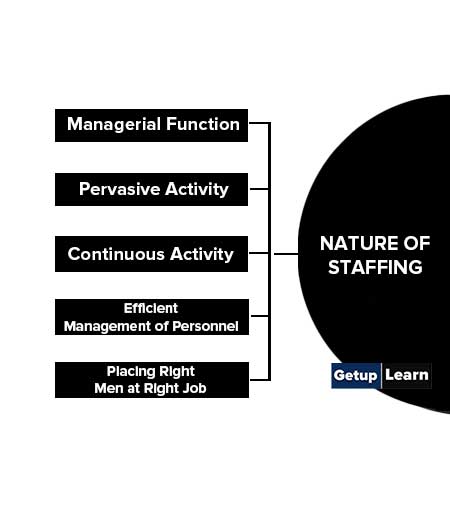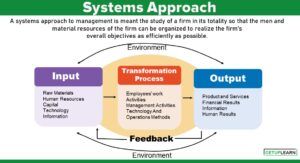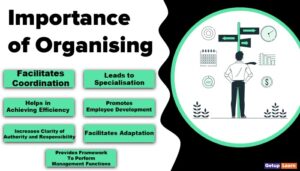Table of Contents
What is Staffing Process?
Staffing is the process of hiring eligible candidates in the organisation or company for specific positions. In management, the meaning of staffing is an operation of recruiting employees by evaluating their skills, and knowledge and then offering them specific job roles accordingly.
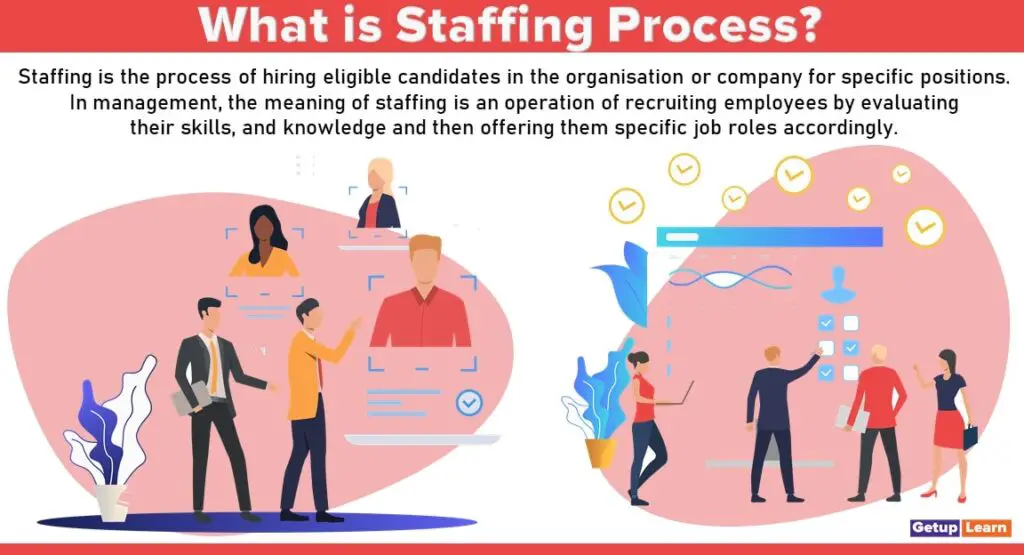
Meaning of Staffing
Staffing refers to the managerial function of hiring and developing employees for carrying out the various managerial and non-managerial functions in an organisation.
This involves deciding the manpower requirement, and the methods of recruiting, selecting, training and developing the people for various positions in the organisation. As a matter of fact, this is a never-ending cycle because the organisation need to retain and update its personnel resources.
The managers have to keep a regular eye on the number and composition of the human resource required by the organisation because the requirement of manpower keeps on changing and expanding with the expansion of activities and additions of new departments and work units.
Not only that, but at any point in time, some people will be leaving, retiring, getting promotions or transferred. The vacancies thus created have to be filled up.
Definition of Staffing
These are some simple and easy definitions of staffing by authors:
[su_quote cite=”Koontz and O’Donnel”]Staffing involves manning the organization structure through proper and effective selection appraisal and development of personnel to fill the roles designed into the structure.[/su_quote]
[su_quote cite=”Theo Haimann”]Staffing pertains to the recruitment, selection, development and compensation of subordinates.[/su_quote]
[su_quote cite=”Getuplearn”]Staffing is defined as, “Filling and keeping filled, positions in the organisational structure. This is done by identifying workforce requirements, inventorying the people available, recruiting, selecting, placing, promoting, appraising, planning the careers, compensating, training, and developing existing staff or new recruits so that they can accomplish their tasks effectively and efficiently./su_quote]
[su_quote cite=”Getuplearn”]The managerial function of staffing involves manuring the organisational structure through the proper and effective selection, appraisal and development of personnel to fill the roles designed into the structure.[/su_quote]
Importance of Staffing
Staffing is people-centred. Success in dealing with people will depend upon the degree to which they are perceived as making real contributions to the solution of management’s problems.
It should be remembered that every manager is expected to perform this function because he is engaged in getting things done and with the help of people. There is various importance of staffing. These are as under:
- Finding Efficient Worker
- Increased Productivity
- Maintains Harmony
- Morale Boosting
- Optimum Utilization of Human Resources
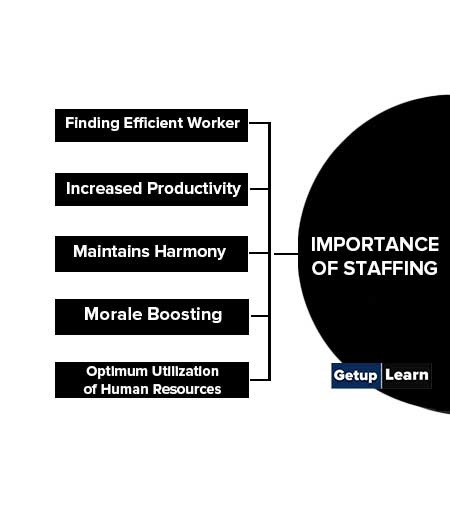
Finding Efficient Worker
Staffing helps in discovering talented and competent workers and develops them to work more efficiently for the achievement of organizational goals.
Increased Productivity
Staffing ensures greater production by putting the right man at the right job. It helps in improved organizational productivity through proper selection according to requirements.
Maintains Harmony
Staffing maintains harmony in the organization. Through proper staffing, individuals are not just recruited and selected but their performance is regularly appraised and promotions are done. This gives everyone an equal opportunity for getting better compensation which finally results in peace and harmony.
Morale Boosting
Job satisfaction keeps the morale high of the employees. Through training and development, programmers’ efficiency improves and they feel assured of their career advancement.
Optimum Utilization of Human Resources
Staffing helps in the proper utilization of the available personnel. Manpower forecasting provides a basis for the recruitment, transfer and training of employees. Shortage or surplus of manpower will be revealed by proper manpower planning.
Process of Staffing
These are the steps involved in the process of staffing:
- Manpower requirements
- Recruitment
- Selection
- Orientation and Placement
- Training and Development
- Performance Evaluation
- Promotion and Transfer
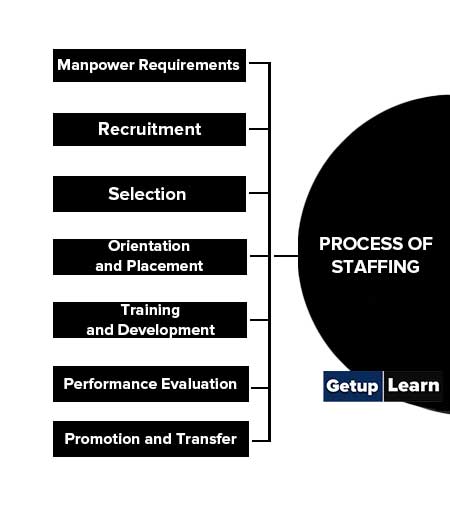
Manpower requirements
It is seen that the first step towards staff- ing is planning of good manpower which will match the need of particular work.
Recruitment
As per the demand from the organisation, the applications of concerned workers are entertained as per invitations by the company to the desired candidate.
Selection
After receiving applications from candidates, they are scanned as per the suitability of the position and candidature.
Orientation and Placement
After offering the job to the candidate, the initial work is to make the candidate familiar with the working style and environment.
Training and Development
Training is part of incentives which are given to work so as to frame and grow as per the concern. It involves working capability and scope. Remuneration: It is a sort of compensation which is paid by the concern to the new joiners. It depends on the nature of the job skilled or unskilled, physical or mental, etc.
Performance Evaluation
Performance evaluation is a method which will show candidate records such as behaviour, attitudes and progress. It involves regular assessment based on reports from different departments.
Promotion and Transfer
It involves a transfer in the job sector and level which depends on the past performance of the candidate. It is a non-monetary incentive.
Nature of Staffing
The managerial function of staffing is of a continuous nature. The managers have to give attention to the staffing needs of the organisation. The staffing policy of the organisation has to be developed on the basis of the long-term requirements of the organisation.
The nature of Staffing can be explained by the following characteristics:
- Managerial Function
- Pervasive Activity
- Continuous Activity
- Efficient Management of Personnel
- Placing Right Men at Right Job
Managerial Function
Staffing is an important managerial function
Staffing is an important managerial function: Staffing function is the most important managerial act along with planning, organising, directing and controlling. The operations of these four functions de- pend upon the manpower, which is available through the staffing function.
Pervasive Activity
Staffing is a pervasive activity: As staffing function is carried out by all managers and in all types of concerns where business activities are carried out.
Continuous Activity
Staffing is a continuous activity: This is because staffing function continues throughout the life of an organisation due to the transfers and promotions that take place.
Efficient Management of Personnel
The basis of staffing function is efficient management of personnel: Human resources can be efficiently managed by a system or proper procedure, that is recruitment, selection, placement, training and development, providing remuneration, etc.
Placing Right Men at Right Job
Staffing helps in placing the right men at the right job: It can be done effectively through proper recruitment procedures and then finally selecting the most suitable candidate as per the job requirements.
Staffing is performed by all managers depending upon the nature of the business, size of the company, qualifications and skills of managers, etc. In small companies, the top management generally performs this function. In medium and small-scale enterprises, it is performed especially by the personnel department of that concern.
Functions of Staffing
The following are functions of staffing given below:
- The first and foremost function of staffing is to obtain qualified personnel for different job positions in the organisation.
- In staffing, the right person is recruited for the right jobs, therefore it leads to maximum productivity and higher performance.
- It helps in promoting the optimum utilisation of human resources through various aspects.
- Job satisfaction and morale of the workers increase through the recruitment of the right person.
- Staffing helps to ensure better utilisation of human resources.
- It ensures the continuity and growth of the organisation, through development managers.
What is the meaning of staffing?
Staffing involves manuring the organisational structure through the proper and effective selection, appraisal and development of personnel to fill the roles designed into the structure.
What is the best definition of staffing?
Staffing is the process of hiring eligible candidates in the organisation or company for specific positions. In management, the meaning of staffing is an operation of recruiting employees by evaluating their skills, and knowledge and then offering them specific job roles accordingly. By Getuplearn
What is the importance of staffing?
The following are the importance of staffing:
1. Finding Efficient Worker
2. Increased Productivity
4. Maintains Harmony
4. Morale Boosting
5. Optimum Utilization of Human Resources.
What is the process of staffing?
The following are the steps of the process of staffing:
1. Manpower requirements
2. Recruitment
3. Selection
4. Orientation and Placement
5. Training and Development
6. Performance Evaluation
7. Promotion and Transfer.
What is the nature of staffing?
The following is the nature of staffing:
1. Managerial Function
2. Pervasive Activity
3. Continuous Activity
4. Efficient Management of Personnel
5. Placing Right Men at Right Job.

